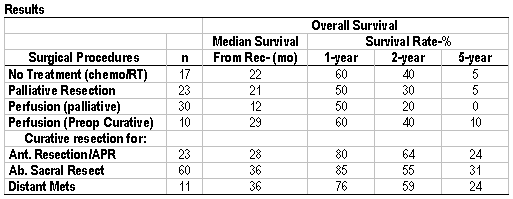# 107588 Abstract ID: 107588 Multi-option Treatment Strategy for Recurrent Rectal Cancer
Harold J Wanebo, Daniel Wrobleski, Michael Vezeridis, Giovanni Begossi, Philip Reiss, Providence, RI
Recurrence after primary resection of rectal cancer is a formidable problem often manifested by local regional disease or distant metastases. The value of aggressive monitoring and surgical intervention is controversial. We have reviewed the disease-free and overall survival outcomes of a multi-option threatment program for patients with recurrent rectal cancer over a 14-year period. Methods: Between 1987-2001, 176 patients were treated at our Institution for recurrence of recto-sigmoid cancer, 156 with rectal cancer and 22 with rectosigmoid cancer. Patient treatment groups included: no surgery (chemoradiation 17 pts), palliative surgery-resection/bypass (23 pts)/ pelvic perfusion (40 pts) and resectional surgery with curative intent (83 pts). The latter included anterior resection/abdominal perineal resection (23 pts) and abdominal sacral resection +/- exenteration in 60 pts. Surgery for distant metastasis to liver (2), Lung (4) & brain (2) was performed with curative intent. For each group we calculated Kaplan-Meyer disease-free survival (DFS), overall survival (OS) curves and median survival from recurrence. Results, There were 96 males and 80 females, 85% were referred from outside institutions; 71% of the patients had received adjuvant treatment. Surgical resection for hepatic and lung metastasis, and pelvic surgery with curative intent showed a five-year DFS and OS of 24% and 31% respectively. Neither of the 2 patients with brain metastasis survived. The palliative group and patients without surgery show equivalent DFS and OS rates. There is a significant DFS and overall survival advantage for patients treated with curative approach vs. those with no surgery or palliative surgery (Log-rank p=.029, Wilcoxon p=.015). Conclusions: Treatment of recurrent rectal or recto-sigmoid cancer is not standardized. Results of surgical and/or adjuvant intervention are poorly defined. Our experience suggests that surgery with curative intent has a survival advantage, especially for liver, lung and isolated recurrence in the pelvis. Clinical trials are warranted to test the value of aggressive monitoring and intervention in these patients.

|
 500 Cummings Center
500 Cummings Center +1 978-927-8330
+1 978-927-8330
 +1 978-524-0461
+1 978-524-0461